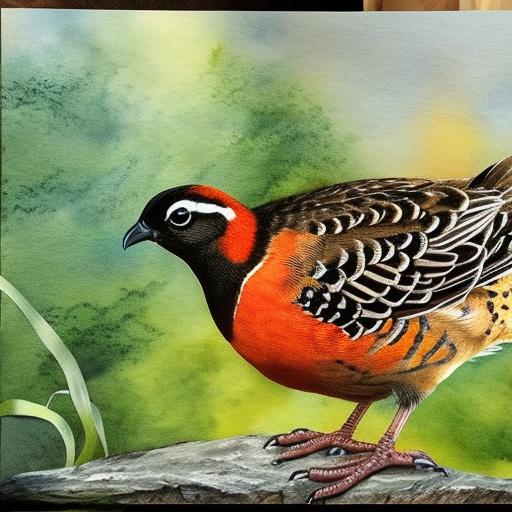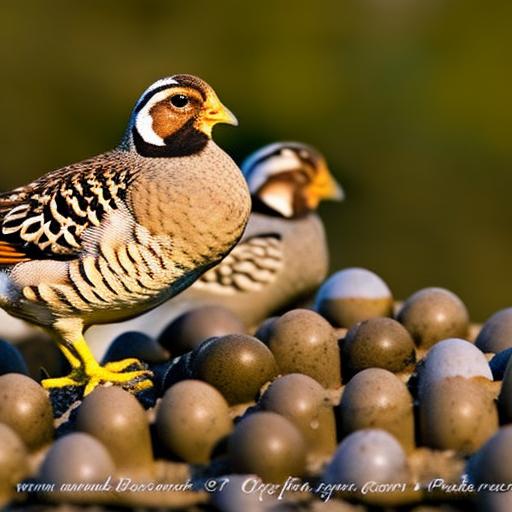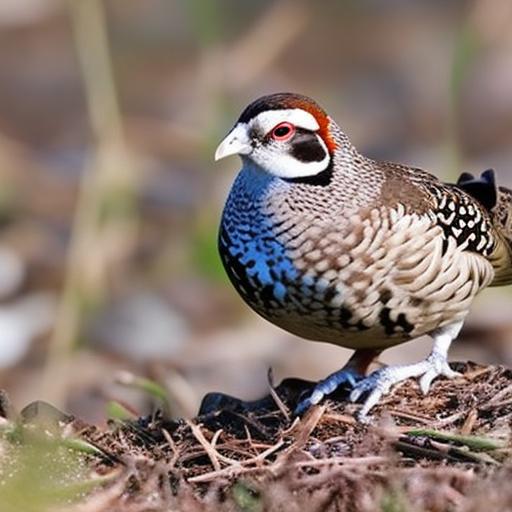Tennessee Red Quail, also known as the Tennessee Red Bobwhite, is a popular breed of quail known for its vibrant red plumage and friendly disposition. These quail are native to the southeastern United States and have been bred for their striking appearance and gentle nature. Tennessee Red Quail are a favorite among breeders and hobbyists alike due to their ease of care and their ability to thrive in a variety of environments.
Tennessee Red Quail are a medium-sized breed, with males typically reaching around 10 inches in length and females slightly smaller at around 8 inches. Their bright red feathers make them a visually stunning addition to any quail collection, and their calm demeanor makes them a joy to work with. Whether you are a seasoned quail breeder or just starting out, Tennessee Red Quail are an excellent choice for anyone looking to add a unique and beautiful bird to their flock.
Key Takeaways
- Tennessee Red Quail are a popular breed known for their vibrant red plumage and friendly disposition.
- When selecting breeding stock, look for birds with good health, strong genetics, and desirable traits such as color and size.
- Creating the ideal breeding environment involves providing spacious and clean housing, proper nutrition, and a stress-free atmosphere.
- The breeding and incubation process requires careful monitoring of egg production, proper incubation conditions, and attention to hatching and chick care.
- Caring for Tennessee Red Quail chicks involves providing warmth, proper nutrition, and a clean environment to ensure their health and growth.
Selecting the Right Breeding Stock
When it comes to breeding Tennessee Red Quail, selecting the right breeding stock is crucial to ensuring the health and vitality of the offspring. Look for birds that are in good physical condition, with bright, vibrant plumage and clear, bright eyes. Avoid birds that appear lethargic or have any signs of illness or injury. It’s also important to consider the temperament of the birds, as gentle, friendly birds are more likely to produce offspring with similar traits.
When selecting breeding stock, it’s also important to consider genetic diversity. Inbreeding can lead to a host of health issues in offspring, so it’s important to choose birds that are not closely related. This will help ensure the overall health and vigor of the offspring. Additionally, look for birds that have a history of good egg production and successful hatching, as this will increase the likelihood of producing healthy chicks.
Creating the Ideal Breeding Environment
Creating the ideal breeding environment for Tennessee Red Quail is essential for successful breeding and hatching. Start by providing a spacious and well-ventilated coop or aviary for your breeding stock. This will give the birds plenty of room to move around and engage in natural behaviors, which can help reduce stress and promote overall health.
It’s also important to provide plenty of nesting boxes or areas for the hens to lay their eggs. These should be filled with clean, dry bedding material such as straw or wood shavings to provide a comfortable and safe environment for egg laying. Additionally, make sure to provide a balanced diet for your breeding stock, including a high-quality game bird feed and access to fresh water at all times.
In addition to providing a comfortable living environment, it’s important to monitor the breeding stock for signs of stress or aggression. If any birds are displaying aggressive behavior towards each other, it may be necessary to separate them to prevent injury. By creating a peaceful and comfortable environment for your breeding stock, you can help ensure successful breeding and healthy offspring.
Breeding and Incubation Process
Breeding Tennessee Red Quail is a relatively straightforward process, but there are a few key steps to keep in mind to ensure successful hatching. Once your breeding stock is in place and settled into their environment, you can begin collecting eggs for incubation. It’s important to collect eggs daily and store them in a cool, dry place until you are ready to start the incubation process.
When it comes to incubating Tennessee Red Quail eggs, it’s important to use a reliable incubator that can maintain a consistent temperature and humidity level. The ideal temperature for incubating quail eggs is around 99.5 degrees Fahrenheit, with a humidity level of around 50-60%. It’s important to monitor these levels closely throughout the incubation process to ensure optimal conditions for hatching.
The incubation period for Tennessee Red Quail eggs is approximately 21 days. During this time, it’s important to turn the eggs several times a day to prevent the embryos from sticking to the shell membrane. This can be done manually or with an automatic egg turner, but it’s crucial to ensure that the eggs are turned regularly to promote healthy development. As the hatch date approaches, it’s important to closely monitor the eggs for signs of pipping, which is when the chicks begin to break through the shell. Once the chicks have hatched, they should be left in the incubator for several hours to dry off before being moved to a brooder.
Caring for Tennessee Red Quail Chicks
Caring for Tennessee Red Quail chicks requires careful attention to their needs in the first few weeks of life. Once the chicks have hatched and dried off in the incubator, they should be moved to a brooder that is equipped with a heat lamp to maintain a temperature of around 95 degrees Fahrenheit for the first week. The temperature can then be gradually reduced by 5 degrees each week until it reaches room temperature.
In addition to maintaining the proper temperature, it’s important to provide the chicks with a balanced diet that meets their nutritional needs. A high-quality game bird starter feed is ideal for young quail chicks, as it provides essential nutrients for healthy growth and development. It’s also important to provide fresh water at all times, either through a shallow dish or specialized chick waterer.
As the chicks grow, it’s important to monitor their health and behavior closely. Look for signs of illness or injury, such as lethargy, drooping wings, or labored breathing, and seek veterinary care if necessary. Additionally, provide plenty of space for the chicks to move around and engage in natural behaviors, as this will help promote overall health and well-being.
Health and Nutrition Considerations

Maintaining the health and nutrition of Tennessee Red Quail is essential for their overall well-being and productivity. Providing a balanced diet that meets their nutritional needs is crucial for promoting healthy growth and development. A high-quality game bird feed that is specifically formulated for quail is ideal, as it provides essential nutrients such as protein, vitamins, and minerals.
In addition to providing a balanced diet, it’s important to monitor the health of your quail regularly. Look for signs of illness or injury, such as lethargy, drooping wings, or changes in behavior, and seek veterinary care if necessary. Additionally, keep their living environment clean and well-maintained to prevent the spread of disease and parasites.
It’s also important to provide access to fresh water at all times, as dehydration can quickly become a serious issue for quail. Make sure that waterers are kept clean and free of debris, and monitor water consumption closely to ensure that your quail are staying properly hydrated.
Selling and Marketing Tennessee Red Quail
Once you have successfully bred and raised Tennessee Red Quail, you may be interested in selling them or marketing them to other breeders or enthusiasts. When it comes to selling quail, it’s important to have a clear understanding of local regulations and requirements regarding the sale of live birds. Make sure that you have any necessary permits or licenses in place before offering your quail for sale.
When marketing Tennessee Red Quail, it’s important to highlight their unique characteristics and qualities. Emphasize their vibrant red plumage, gentle nature, and ease of care as selling points that will appeal to potential buyers. Consider creating an online presence through social media or a website to showcase your quail and reach a wider audience.
Networking with other breeders and enthusiasts can also be an effective way to market your quail. Attend local poultry shows or events, join online forums or groups dedicated to quail breeding, and reach out to potential buyers directly through word of mouth or social media.
By taking the time to market your Tennessee Red Quail effectively, you can attract potential buyers who will appreciate these beautiful birds and provide them with a loving home.
If you’re interested in breeding Tennessee red quail, you may also want to explore the topic of feeding poultry. Poultry Wizard has a helpful article on whether geese can eat chicken feed, which can provide valuable insights into the nutritional needs of different types of poultry. Check out the article here to learn more about this important aspect of poultry care.
FAQs
What is the Tennessee Red Quail?
The Tennessee Red Quail is a breed of quail known for its vibrant red plumage and friendly disposition. It is a popular choice for breeders and hobbyists due to its attractive appearance and ease of care.
How do you breed Tennessee Red Quail?
Breeding Tennessee Red Quail involves providing a suitable habitat with proper nesting areas, food, and water. Breeding pairs should be introduced in a spacious enclosure with plenty of hiding spots. The female will lay eggs in the nesting area, and the male will help incubate them.
What do Tennessee Red Quail eat?
Tennessee Red Quail are omnivores and eat a diet consisting of commercial game bird feed, seeds, insects, and fresh greens. It is important to provide a balanced diet to ensure their health and reproductive success.
How long does it take for Tennessee Red Quail eggs to hatch?
Tennessee Red Quail eggs typically take about 17-18 days to hatch. It is important to provide a warm and stable environment for the eggs during the incubation period.
What are the ideal conditions for breeding Tennessee Red Quail?
Ideal breeding conditions for Tennessee Red Quail include a spacious and secure enclosure, proper nutrition, access to clean water, and a suitable nesting area. It is also important to provide a stress-free environment to encourage successful breeding.
Meet Walter, the feathered-friend fanatic of Florida! Nestled in the sunshine state, Walter struts through life with his feathered companions, clucking his way to happiness. With a coop that’s fancier than a five-star hotel, he’s the Don Juan of the chicken world. When he’s not teaching his hens to do the cha-cha, you’ll find him in a heated debate with his prized rooster, Sir Clucks-a-Lot. Walter’s poultry passion is no yolk; he’s the sunny-side-up guy you never knew you needed in your flock of friends!







